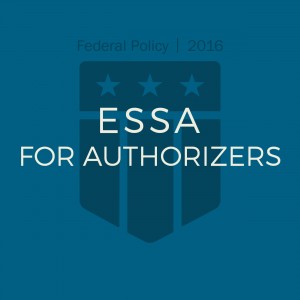1/28/16 Dear Colleague Letter, 2/26/16 FAQs
 Last week, the US Department of Education issued a new Frequently Asked Question (FAQ) document concerning the transition to the Every Student Succeeds Act (ESSA). The FAQs follow the Department’s second “ESSA Dear Colleague Letter,” released late January.
Last week, the US Department of Education issued a new Frequently Asked Question (FAQ) document concerning the transition to the Every Student Succeeds Act (ESSA). The FAQs follow the Department’s second “ESSA Dear Colleague Letter,” released late January.
Together, the documents cover several topics related to data collection and reporting, high quality teacher provisions, and accountability and intervention during these transition years. The Department has stated their intent to continually update the FAQs as the transition continues.
Key Takeaways
- The anticipated data gaps for the 2014-15, 2015-16, and 2016-17 school years continue to be fleshed out. This latest guidance does not identify any new data gaps, but it does reiterate some gap areas we’ve already identified in the areas of Annual Measurable Objectives/Adequate Yearly Progress, and teacher quality.
- It is important to note that data gaps resulting from the federal transition in ESSA may not account for all anticipated data gaps in each state, especially given many states’ transitions in standards and assessments.
- States and LEAs will have more flexibility in how and where they use Title I funds in the 2015-16 and 2016-17 school years.
- High Quality Teacher (HQT) requirements—and the associated teacher evaluations—are on the way out. The law keeps them in place until August 1, 2016, but many of the federal reporting requirements are now officially obsolete. States will have time to develop their ESSA compliant teacher quality systems in the 16/17 school year.
What You Can Do Now
- Ask your SEA for guidance on how you should monitor HQT and state teacher evaluation requirements for the remainder of the 2015-16 academic year, and what reports on these topics charter schools will still need to submit.
- Your SEA may not have an answer right now. But they need to have one for authorizers and charter schools soon, likely in the next six months. The state will have significantly fewer federal reporting requirements on both topics, and that may translate into modified monitoring and reporting requirements for charter schools and authorizers.
- Familiarize yourself with the new Title I flexibility and make adjustments, as needed, to your compliance-based monitoring of Title I fund use for the 2015-16 and 2016-17 school years. Much of the new flexibility is at the state level, but some will apply at the LEA level to charter schools. Again, your SEA should provide guidance on this issue.
- Keep asking your office-or-state data officer which state report card measures will be impacted and how that will translate into data availability. The sooner you know what data points may be impacted the sooner you can work on a plan with schools in your portfolio.
NACSA is Here to Help
Are there questions you still have, new issues that have come up in your state, or successes you’ve had navigating similar types of transitions? Please let us know! The more feedback we have on what is happening on the ground the better we can address authorizers’ needs during this important process.
Bookmark our ESSA for Authorizers page for updates and resources to help you during this critical transition period.


